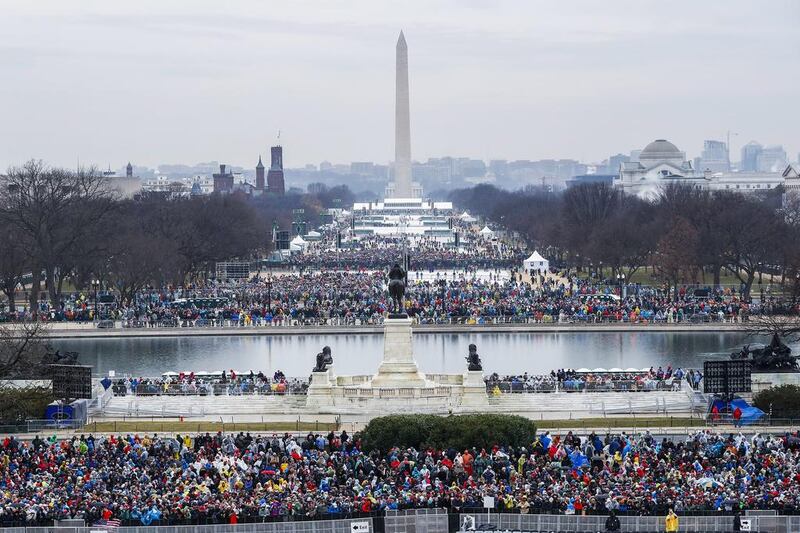Every November, a small village in Cumbria in northwest England holds the “world’s biggest liar” competition. It’s a piece of fun in which competitors have five minutes to tell the biggest and most convincing lies.
The rules bar two professions from taking part: politicians and lawyers. These professions are said to be too skilled in telling lies.
You might need no convincing on that point. The Washington Post estimates that in his first 400 days in office US President Donald Trump has made more than 2,400 misleading or downright false claims.
The New York Times went so far as to publish a long list of what it said were Mr Trump's lies and claimed he told six times more falsehoods in just a few months than Barack Obama did in all eight years of his presidency.
But what is striking is that, reading through the list of Mr Trump's lies, the president would not win the biggest liar competition. His efforts are so obviously, demonstrably, untrue.
He claimed, for example, to have been against the 2003 Iraq war. He publicly supported it. He boasts about the popularity of his inauguration when television pictures showed it was not well attended. He claimed Americans pay the highest taxes in the world. They don’t. He tweeted that North Korea “agreed to denuclearisation”. They haven’t, although let’s hope they do.
And his verbal contortions over his relationship with porn star Stormy Daniels would be laughable, if they were not so demeaning of the great office of the presidency.
But the bigger question is whether lying actually matters anymore. More than a third of American voters continue to support Mr Trump and presumably would do so even if he claimed he was the first man on the moon. (He wasn't, just to be clear.)
Chicago university professor John Mearsheimer is an expert on when lies matter and when they do not seem to do so. In his book Why Leaders Lie, Prof Mearsheimer divides the telling of falsehoods into three categories – lies, deceit and spin.
He quotes a 19th century British statesman, Sir Henry Taylor, as observing that “falsehood ceases to be falsehood when it is understood on all sides that the truth is not expected to be spoken”.
This seems to be an important observation. Lies may be permissible, even advisable, in some circumstances.
_____________________
Read more from Gavin Esler:
[ The best way to prepare for the future is to create it yourself ]
[ Republicans' loyalty will be sorely tested in the midterms ]
[ I stand with Elon Musk: meetings are the enemy of creativity ]
_____________________
Sir Winston Churchill once quipped that in war, the truth is so precious it must always be surrounded “by a bodyguard of lies”. I doubt many would criticise Churchill for that. Nor do we really expect a finance minister to give entirely straight answers about devaluing a currency or other market-sensitive information.
And so Mr Trump’s extraordinary political achievement appears to be that in carpet-bombing the world with his misstatements, when a blatant falsehood is uncovered, most of us just shrug and assume that deception is just the new normal in Washington.
Sir Henry was correct: in the White House, “the truth is not expected to be spoken” by Mr Trump, nor by his closest associates. His lawyer Rudy Giuliani more or less admitted as much when he said publicly that he was focusing on the law rather than the facts.
This might be an effective political survival strategy but it has profound consequences. Domestically in the US, it means Mr Trump and his allies need to blacken the reputation of courts, judges, journalists and the FBI.
Internationally it might encourage others to tell enormous lies too. There is considerable evidence that the Assad regime is blatantly lying about its use of chemical weapons in Syria. Russia also appears to be thoroughly deceitful over the attack on British soil using nerve gas. British politicians have been, in that wonderfully English phrase, “economical with the truth” over Brexit.
So when Mr Trump meets President Kim Jong-un, let us hope these two leaders do create a lasting peace on the Korean peninsula — but whatever they say, the normalisation of untruths in political life suggests we should be very sceptical of any deal they may produce.
As a friend in Washington once put it, reciting an old joke: “How do you know when a politician is lying? His lips are moving.”
But how about the rest of us? Do ordinary citizens often tell lies, bend the truth or act deceptively? Has deception become normal in our lives too?
Well, just remember the last time you bought something and came to the point where you had to tick a box saying you have read the terms and conditions. Have you ever – ever – read the terms and conditions? Neither have I. Some T&Cs stretch to 30,000 words, twice the length of Shakespeare's Hamlet.
So perhaps this November any of us could go to Cumbria and win the world’s biggest liar competition with a speech saying: “I always read the terms and conditions on every internet purchase”. Even Mr Trump would find that obvious falsehood hard to beat.
Gavin Esler is an author, journalist and television presenter





